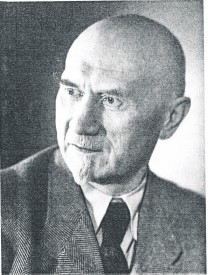American Anthropologist, "Museumsmann". Born Schwiebus (Germany) 27 june 1885, died Berlin (Germany) 15 july 1962. Krickeberg started his academic career in Berlin as student of American anthropology under Eduard Seler [1849-1922]. In 1906 he was employed as "wissenschaftlicher Hilfsarbeiter" at the Ethnographical Museum, which remained his life-long institutional affiliation. Due to the First World War he got his Ph. D. somewhat belated in 1922 and completed publication of his important dissertation on the Totonacs in 1925 only. This was the first synthetic monograph of archaeology, history and ethnology in Mesoamerican research and has served as a model for later authors.
Krickeberg was not a distinguished field worker (two sight-seeing trips to Mexico in 1939/40 and 1958/59), as most of his museum colleagues in the American section (Karl von den Steinen[ 1855-1929], Konrad Theodor Preuß[1869-1938] and Walter Lehmann [1878-1937]) were. Instead he was the leading writer of well informed overviews and synthetic monographs on general topics of the American Indian, during the first half of the 20th century. He started with two popular books on myths and legends, and general surveys of American Indian cultures for the handbooks of Georg Buschan [1863-1942] and Hugo Adolf Bernatzik [1897-1953].
One of the best monographs of an American culture area to date is his Altmexikanische Kulturen (1956). Late in his life he co-authored a survey of American Indian religions and prepared a survey on rock art, not completed during his lifetime (vol. I published by Krickeberg himself in 1949, vol. I published posthumously by Karin Hahn-Hissink, M.-B. Franke and Dieter Eisleb, 1969). These publications are all characterized by his vast knowledge of basic facts and his diligent perusal of current research as well as his outstanding ability to work out general characteristics and historical trends for ethnic groups and entire culture areas. Krickeberg adhered to the "kulturhistorische Völkerkunde" more on the lines of Alfred L. Kroeber [1876-1960] and Robert H. Lowie [1883-1957] than to the German "Kulturkreislehre". In contrast to the American culture historical school, however, Krickeberg was favorably inclined towards the notion of transpacific cultural diffusion along the lines of Robert Freiherr von Heine-Geldern [1885-1968] and Gordon Ekholm [1909-1987]. During the Nazi regime Krickeberg mis-used his institutional power against colleagues (controversy over the Lehrbuch für Völkerkunde) and employees of the museum of which he was director. Nevertheless he was acquitted of all accusals by the U.S. military government and was re-installed as director of the Berlin Ethnographical Museum and as honorary professor, posts he held until his regular retirement in 1954.
(text written by Frauke Riese, by courtesy of Berthold Riese; photo source: Obituary by Hissink in Paideuma IX, 1963, pg. 79)



